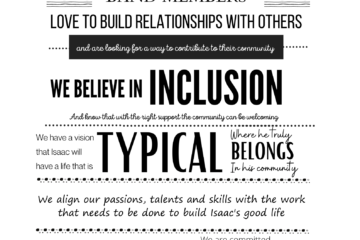Trust is Key
When your family member’s support workers feel you trust them, they will be more willing to voice concerns and offer suggestions to improve on the way things are done. If there is trust among team members they can focus on delivering the best outcomes without the worry of making a mistake in front of their colleagues. They will be more willing to give things a go and work together.
Working with a team that you trust will also bring you joy and less anxiety. It will give you confidence to let go a little and you’ll be able to back away from the daily grind of coordinating staff activities and just lead from a distance.
But trusting can be hard
Trusting staff who are taking care of your family member can be really hard can’t it. Especially when you hear all the stories of abuse of people with disability in the news.
So it can seem sensible to wait until someone has earned our trust. We can withhold our trust to protect ourselves and our family member. We can turn to micromanaging to maintain control and limit trust.
It can be impossible to earn trust
But the problem with earning trust is that it requires keeping score and often you won’t be sharing your scoring system.
It’s not possible to be good enough for long enough so trust can never be earned so you will forever be waiting until you can trust your team and let go a little. You’ll be stuck in the daily management of your team.
Trusting starts with you
Earning trust is “me focussed” – sorry to say this, but this isn’t about you. It’s about what works for your family member and your team.
As a leader you must also serve your team.
So rather than waiting for employees to earn your trust make trust your responsibility. If you want others to trust you – it’s your responsibility. If you want to be able to trust others then make it your responsibility.
Someone needs to trust first – that’s what leaders do, go first. So you will need to give your staff your trust.
Smart Trust
But that doesn’t mean that you blindly trust people either.
In his book Smart Trust, Stephen Covey talks about the concept of Smart Trust. He says
He says trust without analysis is blind trust or gullibility and analysis without trust is simple distrust.
We need to asses the level of risk – how disastrous is it if it doesn’t work out. Can you let them make mistakes so they can learn from them? Does the person have the right character and competence?
But we must do this from a starting point of a trusting mindset.
Do you have a tendency to trust?
Become a better leader so that you can step back
Learn how to become an effective leader of your team of supports so that you can empower them and step back from the daily grind of management in the Lead Your Team Project



